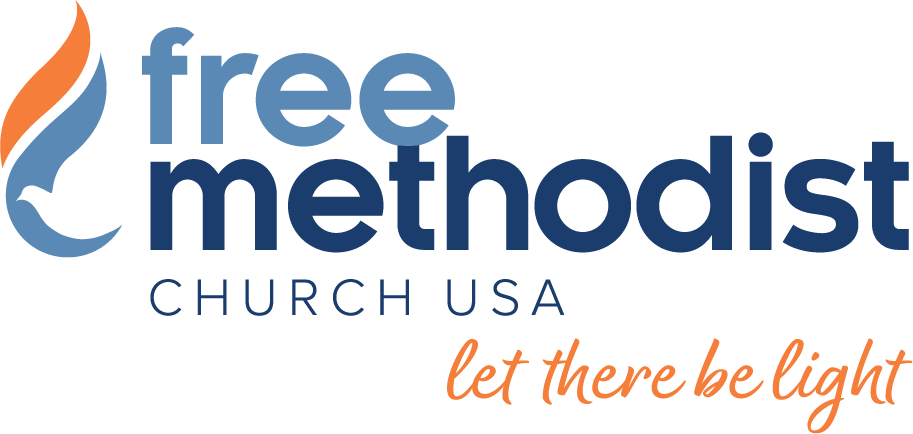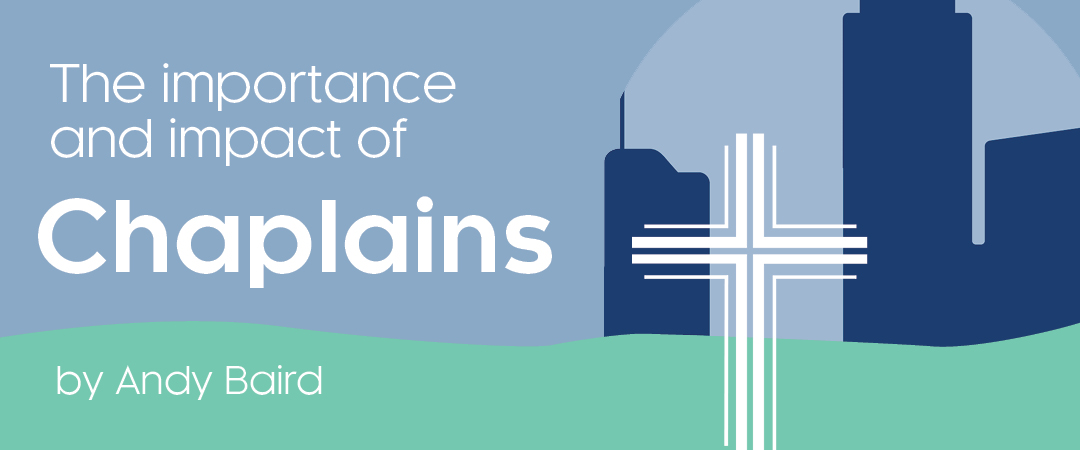A patient is in their hospital bed. Their family is around. The machines have all been turned off. A soul is about to pass from this world to the next.
A senior military leader is about to make a decision that will determine if the mission succeeds and if the leader’s troops will perish. The pure weight of this decision will follow the leader for the rest of the leader’s life.
A prisoner has been incarcerated for several years. They have recently started to attend church services at the prison and are on the verge of making a decision about faith.
Closed communities. Sacred spaces. Places where a select few are allowed to go. Moments where life and death, past and future are all hanging in the present. These are the spaces where chaplains exist and are needed.
While these spaces and places are vitally important, they are often overlooked by the greater church body.
“Since this specialty ministry takes place beyond the structure and eyes of the church, little is written about it in church publications,” E. Dean Cook explained. “Chaplains, out of respect for confidentiality and the institutions they serve, traditionally have not written a great deal about their work, except in professional magazines. All of this has led to a serious gap in the church’s understanding and awareness of this ministry.”[1]
Think of your conference. How many chaplains are elders within that conference? Do you know? Did you have to look it up in the Yearbook? Have you talked with those chaplains about the unique community they serve?
In most of Matthew 24 and 25, Jesus is addressing the disciples on the Mount of Olives. He provides a few parables and lessons about the coming days. Then, in Chapter 25, he starts to describe the Judgment:
“Then the King will say to those on his right, ‘Come, you who are blessed by my Father; take your inheritance, the kingdom prepared for you since the creation of the world. For I was hungry and you gave me something to eat, I was thirsty and you gave me something to drink, I was a stranger and you invited me in, I needed clothes and you clothed me, I was sick and you looked after me, I was in prison and you came to visit me.’
“Then the righteous will answer him, ‘Lord, when did we see you hungry and feed you, or thirsty and give you something to drink? When did we see you a stranger and invite you in, or needing clothes and clothe you? When did we see you sick or in prison and go to visit you?’
“The King will reply, ‘Truly I tell you, whatever you did for one of the least of these brothers and sisters of mine, you did for me.’” (v.34–40 NIV)
This passage is one of the primary scriptural references for the basis of chaplain ministry. People in need often do not seek out help, requiring those who serve Christ to go to them. Chaplains go where there is need, standing in the gap with those who would not otherwise receive help from the church. In my personal experience, many of the warriors I serve would never walk through the doors of a church. In fact, coming to talk to the chaplain is their answer when everything else has failed. They know that they need something: confidential counseling, sound advice, a person to listen to their struggles, but they don’t know what that need is. Chaplaincy is truly an incarnational ministry, where you often live, work with, rub shoulders with, and eat with those you serve.
“The roots of Free Methodist Chaplaincy can be traced back to World War II and the nation’s urgent call for chaplains to minister to our troops.”[2] There were several young clergy members from our denomination who served during the Second World War, having impacts across multiple continents and aspects of that war. Since that time, Free Methodist chaplains have served in a variety of positions and ministry spaces. Hospital, hospice, law enforcement, prisons and jails, the military, retirement communities, sports teams, colleges and universities. Chaplains in all of these different places have three primary things in common.
Calling
Calling is one of the most, if not the most, pivotal parts of chaplaincy. Serving in these closed communities is seldom easy and requires a special type of calling. Os Guinness tells us, “Our passion is to know that we are fulfilling the purpose for which we are here on earth.”[3]
No one person’s calling to chaplaincy looks exactly like another’s. My call to chaplaincy came, to paraphrase J.R.R. Tolkien, from the most unlikely of people. I was working nights at UPS after graduating from college. I had graduated with a degree in ministry focused on worship arts. Unfortunately, I graduated in 2009, right in the middle of a recession.
To help provide for my family, I was a stay-at-home dad during the day, and loaded trucks at UPS in the evenings. After working there for a few months, and getting to know my co-workers, one who had previously served in the Marine Corps asked me if I had ever thought about being a military chaplain. I politely told him, “No,” that I had just finished my bachelor’s degree and didn’t want to go back to school and that I was happy to work with youth or lead worship but didn’t think that being in charge of what I perceived to be a bigger responsibility was something I aspired to. However, as I thought, prayed, and asked my mentors about this, it became apparent that God was calling me to this unique ministry.
“To be called by God is to be one who has heard and answered the call that God makes,” according to Carey H. Cash. “In the end, not all men respond to that call. But for those who do, nothing, absolutely nothing, can separate them from God’s providential plan working out in their lives.”[4]
Like Jonah, I was being called to what was to me a foreign land. Within a few months, I had enrolled in seminary and started the process of joining the U.S. Army Reserve as a chaplain candidate.
Preparation
The next important step in becoming a chaplain is preparation. The requirements for every type of chaplaincy vary to some degree. Almost all require an endorsement from a denominational endorsing agent (for Free Methodists, this is currently Tim Porter). Candidates for this are often presented to whichever current bishop oversees our chaplain ministries (currently Bishop Keith Cowart). Both also usually require ordination as an elder within your current conference. According to Richard M. Budd, “Traditionally the triumvirate of occupations accorded professional status in America has included ministry, which is the eldest, plus law and medicine.”[5]
Some forms of chaplaincy require an M.Div. or equivalent seminary degree, the military being one of these. Many hospital and hospice chaplain settings require Clinical Pastoral Education (CPE), which can be earned either through a residency or through individual credits. Other chaplain settings may require still other accreditations or trainings to serve that community.
Opportunity
Once a person has discerned a calling and done the necessary preparation, that person is able to seize the opportunities provided by all the work they have put in. Very few ministry settings have opened opportunities to see large change happen like chaplaincy. In my current assignment of working with basic trainees, I have been able to work with multiple trainees who have accepted Christ, baptized over 200 of them, and worked with many drill sergeants and other cadre members as they struggle through difficult life situations.
If you think that exploring a call into chaplaincy could be a part of your future, reach out to FMCUSA Co-Directors of Chaplain Ministries Tim (timothy.porter@myfmconnect.org) or Patricia (patricia.porter@myfmconnect.org) Porter.
Chaplain Captain Andy Baird is an ordained elder in the North Michigan Conference of the Free Methodist Church and is currently stationed at Fort Moore, Georgia. He holds a Bachelor of Science degree in ministry from Central Christian College of Kansas and a Master of Divinity degree from George Fox Evangelical Seminary, and he is currently working on his Doctor of Ministry degree from Wesley Theological Seminary. He and Allison have four children, who constantly keep life moving. They enjoy spending time with their family, and (when able) doing things without kids.
[1] E. Dean Cook, Chaplaincy: Being God’s Presence in Close Communities (Bloomington, IN, AuthorHouse, 2010), xi-xii.
[2] Ibid, 9.
[3] Os Guinness, The Call: Finding and Fulfilling the Central Purpose of Your Life (Nashville, TN, Thomas Nelson, 2003), 1.
[4] Carey H. Cash, Table in the Presence: The Dramatic Account of How a U.S. Marine Battalion Experienced God’s Presence Amidst the Chaos of The War in Iraq (Nashville, TN, Thomas Nelson, 2009), 41.
[5] Richard M. Budd, Serving Two Masters: The Development of American Military Chaplaincy, 1860-1920, (Lincoln, NE, University of Nebraska, 2002), 3.

